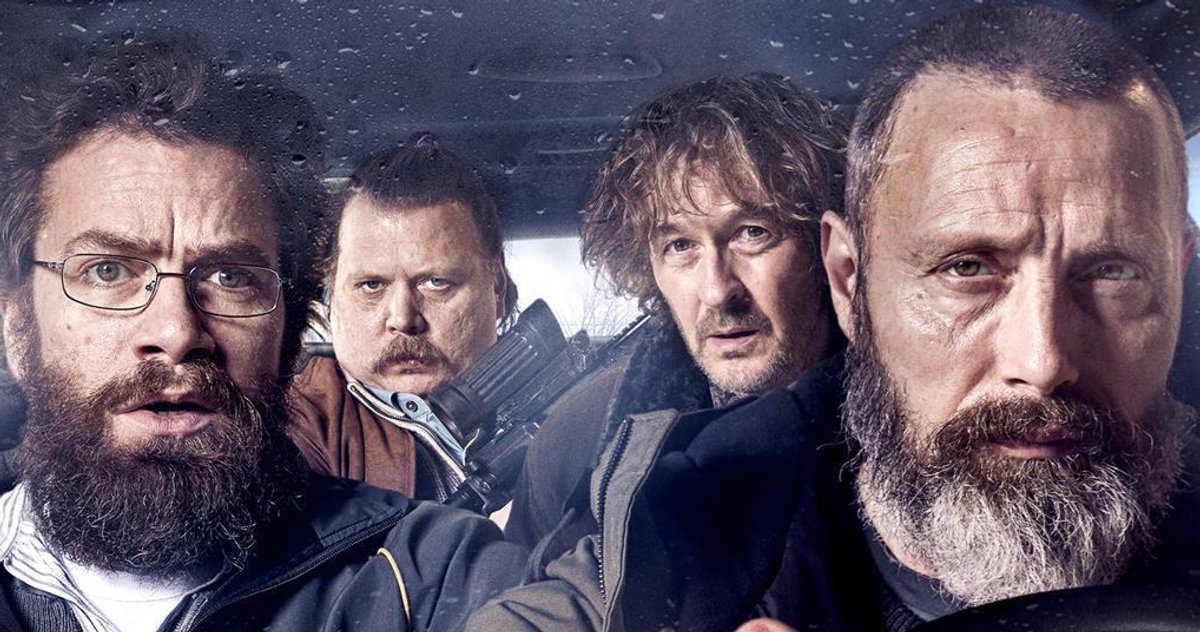It’s impossible to pigeon-hole RIDERS OF JUSTICE. Part tragedy, part very black comedy, part action/revenge, it is nevertheless also a perceptive examination of troubled souls longing for surcease of sorrow for whom the usual therapeutic methods have failed. If that were all, it would be enough, but it goes further, essaying nothing less than a search for meaning in a world at the mercy of random flicks of happenstance.
It begins simply enough with a sweet young Estonian girl’s wish for a blue bicycle for Christmas. Alas, the purveyor of said merchandise has only a red one. No matter, a phone call to the right person causes the theft of such a conveyance in Denmark, the which leads to a string of coincidences that ends in a veritable avalanche of unintended consequences. It starts with Emma (Anne Birgitte Lind) being killed in a freak train accident in front of her daughter Mathilde (Andrea Heick Gadeberg), whose bicycle it was that was stolen. They were skipping work and school after Markus (Mads Mikkelsen), husband and father respectively, called from the desert war in which he’s fighting to say he’s staying on for a few more months. She would have survived if only the statistician Otto (Nikolaj Lie Kaas), newly fired for pursuing an algorithm to predict the future, offers her his seat. The gallant gesture brings Markus home to a rocky grieving process with Mathilde.
A grief counselor has warned the father and daughter that they are in perfectly normal state of shock, and each will deal with it in his or her own way. Markus, despite Mathilde’s pleading, declines any of the offered therapy (and this being Denmark, it’s free, which makes his decision all the more self-destructive). As an atheist, he tries reassuring Mathilde that her mother isn’t alone in the afterlife, she is just gone forever, and is astonished that it fails. As a soldier, he is convinced he can deal with it on his own, a decision that will have consequences for more than just himself.
Meanwhile Otto has worked out the odds, 234,287,121 to one against, that the accident was in fact an accident after learning that one of the other casualties was scheduled to testify against the leader of a violent gang named The Riders of Justice. The police send him packing, but he is undeterred. Backed by his two oddball friends, Lennart (Lars Brygmann) and Emmenthaler (Nicholas Bro) with a gift for hacking, he collects evidence illegally, then tracks down Markus and convinces him that they have cracked the case.

Nikolaj Lie Kaas, Nicholas Bro, Lars Brygmann, Mads Mikkelsen
What ensues is Markus’ quest for revenge spiked with the mordant humor of nerds irritating the laconic Markus by obsessing over server speeds, antique barns, and a chemistry lesson during a crime scene clean-up. Markus houses them in his barn, while explaining to Mathilde that they are the grief counselors she wanted. Any doubts about them is subsumed by her desire to get her father help, particularly after he punches out her aqua-haired boyfriend Sirius (Albert Rudbeck Lindhardt). By day, Lennart, a veteran of 4000 hours of therapy, uses a talking cure with Mathilde. By night, the four of them kill the perpetrators of the accident, and the people who ordered it.
The action is brutal. Whether it be the way Markus makes good on a threat to break someone’s nose if they don’t keep quiet, a former victim wreaking havoc on the corpse of a bully, or how the leader of the Riders (Roland Møller) systematically breaks the fingers of an innocent bystander with information that he wants, it is violent both physically and psychologically. Mikkelsen’s quiet performance as a hair-trigger ready to go off at any moment is the perfect counterpoint to the nerdy bickering of his peculiar gang, and it embodies the moral quandary in which he and that gang find themselves. As his daughter, Gadeberg balances the petulance of adolescence with a grief that has no outlet except to rain invectives upon her father. Mikkelsen’s micro-reactions, operating on an almost unconscious level for the viewer, show just how deep they cut, are as difficult to watch as the bloodshed.
Just when it seems that a moral compass is not part of filmmaker Anders Thomas Jensen plan, he tosses in a scathingly brilliant twist to make it central to the plot. For all the absurdity rampant in the telling, this is a compassionate tale of people in pain living on the edges of society who have yet to lose their humanity. When Otto discovers the flow-chart Mathilde has constructed on her wall tracing back the events from her mother’s death back through each decision and occurrence that led to his, he gently explains the vectors and tangents that would eventually encompass the world, and then the universe. Its beyond the human mind, even a bright one like hers, to comprehend. It’s a far more meaningful speech than the one delivered by clergy at Emma’s funeral, and points to, if not a panacea, at least a way to cope with what is beyond our control, much less our understanding.
Ultimately, after bullets fly, necks are snapped, and a winsome Ukrainian sex-slave (Gustav Lindh) is freed to pursue his love of domesticity, our characters find a way to work out their issues in ways that conventional therapy could never achieve. Or sanction. RIDERS OF JUSTICE is a film that challenges the viewer about the most basic assumptions about law, order, and the mechanics of civilization. It’s also as wildly entertaining as it is profoundly subversive.
Your Thoughts?